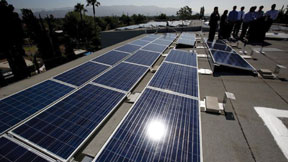
 Minority groups back energy companies in fight against solar power
Minority groups back energy companies in fight against solar power
By Evan Halper
Support from minority organizations has given power companies a potent ally in their fight to slow the spread of solar energy installations. (Anne Cusack / Los Angeles Times) When Florida officials pulled the plug on a significant incentive for rooftop solar systems, the move came at the urging of big power companies with a heavy reliance on fossil fuels — and of the state chapter of the NAACP.
The Florida chapter is one of a number of minority organizations that have aligned with utilities. Their backing has given power companies a potent ally in their fight to slow the spread of solar energy installations. The groups are pressing their case aggressively even as the national NAACP and other large civil rights organizations back solar incentives, arguing they are key to shutting down dirty power plants that contribute to elevated rates of asthma and other diseases in low-income communities.
The groups that have lined up on the utilities’ side are showing up in legislative hearing rooms, regulatory proceedings and on newspaper op-ed pages to make the case that what they call unjust incentives favoring the wealthy undermine the virtues of solar power. Low-income households, they say, are paying higher electric bills to subsidize solar arrays that only wealthier people can afford.
Competing environmental justice groups say other economics are at play, pointing to generous campaign and charitable contributions that utilities have made to some of the groups. Whatever the motivation, groups such as the Florida NAACP are tapping into a long-running tension over renewable energy and a perception in many minority communities that environmental causes are a preserve of the affluent. “It has become a very complex fight,” said Arturo Carmona, executive director of Presente.org, a Los Angeles-based Latino group that is working with environmentalists to promote solar incentives.
“These are good programs. But there is a stigma the utilities are exploiting.” The issue of whether access to solar power is skewed toward the affluent has caught the attention of White House officials. Recently the Obama Administration announced a series of efforts with California authorities aimed at bringing rooftop solar to less expensive dwellings, including apartments, condos and affordable-housing projects.
The fight in the states centers on a policy called net metering, which guarantees homeowners or businesses that have solar panels the right to sell excess electricity back to the power grid at attractive rates. It is key to making solar energy cost-competitive.
“We want solar available for everybody, not just people who are wealthy,” said Joe Gibbons, a former Florida lawmaker. He persuaded the National Black Caucus of State Legislators to pass a resolution that closely resembles one drafted by the American Legislative Exchange Council, the conservative advocacy group partially funded by utility companies. In October, Gibbons traveled to Capitol Hill to enlist Black members of Congress into his campaign.
At a briefing for staff, he was joined by a representative of the Edison Electric Institute, an influential energy industry group. Tax records show the institute gave $10,000 to the National Black Caucus of State Legislators in 2013, the most recent year for which records are available. In the two previous years, the institute gave $17,500 to the National Policy Alliance. It contributed $120,000 to organizations run by the Congressional Black Caucus between 2008 and 2013. The Florida chapter of the NAACP acknowledges utilities are among its donors, but does not disclose how much they give. Alton Drew, an attorney for the group, took exception to the question.
“It is insulting to say that these civil rights groups are on the take because they have a position that may seem aligned with that of energy providers,” he said. “You can draw the conclusion that the program is good, but there is a real question about whether we [minorities] are being included.”
Other civil rights groups say attacking the policy driving the boom in rooftop solar is misguided. “The transition to solar is disproportionately to the benefit of these communities, no matter who owns the systems,” said Jacqui Patterson, the national NAACP’s environmental justice director. Patterson rattled off sobering statistics about the health problems afflicting African Americans living near power plants.
In Indiana, Denise Abdul-Rahman, the environmental co-ordinator for that state’s NAACP chapter, said her group advocated net metering, even though she doubted any of the 600 customers in Indiana’s fledgling program were African American. Indiana, like Florida, is among the states where the program is under attack.
Abdul-Rahman said the Indiana NAACP supported net metering for reasons not only of environmental justice but economic opportunity. “I don’t see any benefit in helping the energy monopolies continue with the status quo,” she said. “Our communities can benefit much more by homing in on the green-energy economic movement.” Still, the debate reveals a political vulnerability for solar advocates. “I don’t blame folks who are afraid that the deck is stacked against them,” Patterson said. “The environmental community and solar industry have a ways to go in engaging with communities of color.”
evan.halper@latimes.com Twitter: @evanhalper


Be the first to comment